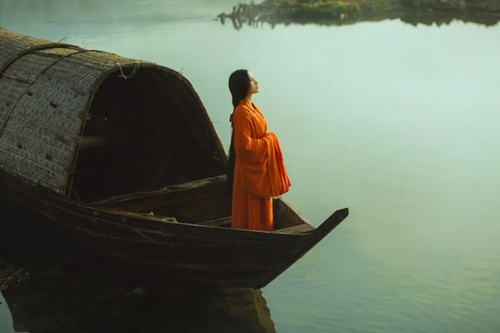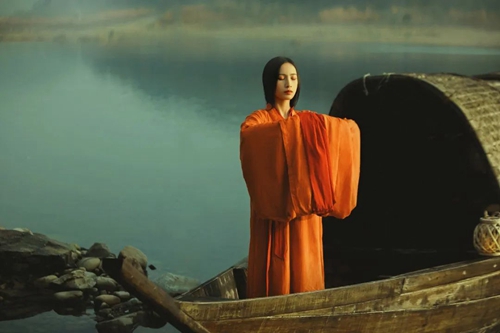"Smell the broken string, know the string" two or three things about Cai Wenji and Guqin
If you want to ask what show is the most popular recently, I have to mention "Sister Riding the Wind and Waves". The talent and singing and dancing of the sisters in the show impressed everyone, but if it is placed in ancient times, "Duan Cao has a trace, and you have a leisurely appearance. "Ou Mingfeng is fierce, let me take care of Tongtong" Cai Wenji must be on the list.

Cai Wenji: When you hear the strings, you know where the strings are
Wen Ji was very smart when she was young. One night, she was woken up by the sonorous sound of the piano, and she turned her ears to listen. It turned out that Wen Ji's father, Cai Yong, devoted almost his entire life to researching and arranging ancient classic books, and often wrote until late at night. He played an instrument to relieve his excessive mental fatigue so that he could resume writing after a short rest.
Once Cai Wenji's father, Cai Yong, was playing the piano. When Cai Wenji was passing by, suddenly his father's string broke. Cai Wenji immediately asked, "Father, is the first string broken?" Cai Wenji's father was very surprised, but still thought that his daughter He just guessed right by mistake, and then he deliberately broke the fourth string and asked Cai Wenji which string was broken? Cai Wenji still answered correctly. Her father noticed that Cai Wenji was talented in music. After that, he began to teach Cai Wenji how to play the piano.

Cai Wenji and Jiao Weiqin
Cai Wenji's father, Cai Yong, was a well-known writer and calligrapher at the time. He was also proficient in astronomy and mathematics, and was a good friend with Cao Cao. Cai Wenji has been fascinated by her ears and eyes since she was a child. She is not only proficient in rhythm, but also good at calligraphy and literature.
One day, when Cai Yong was sitting in his room playing the piano and sighing, someone in the stove next door was making a fire to cook, and the firewood was burning so loudly. Suddenly, Cai Yong heard a crisp cracking sound coming from the next door. He couldn't help being startled. He raised his head and pricked his ears to listen carefully for a few seconds. When he came to the fire, Cai Yong didn't care about the people who were on fire, he stretched out his hand and pulled out the paulownia wood that had just been stuffed into the stove as firewood, and shouted loudly, "Don't burn it, don't burn it, this is a piece of wood. It's a rare and good material for making a qin!" Cai Yong's hand was burned, and he didn't feel any pain, so he was pleasantly blowing and touching it on the paulownia wood. Fortunately, the rescue was timely and the paulownia was still intact, so Cai Yong bought it. Then it was meticulously carved, meticulous and painstaking, and finally this piece of paulownia was made into a piano. When played, this piano has a wonderful tone that is unparalleled in the world.
This qin has been handed down and has become a rare treasure in the world. Because its tail was burnt, it was called "Jiaowei Qin". After Cai Wenji's father passed away, this qin also accompanied Cai Wenji.

Cai Wenji and "Eighteen Shots of Hu Jia"
Her father and husband passed away one after another. On the way to her sister's hometown, they were attacked by the Xiongnu. The Xiongnu soldiers saw her young and beautiful and had a good temperament, so they dedicated her to the Xiongnu's Zuo Xian Wang. Zuo Xian Wang liked her very much, so Cai Wenji became the wife of the Hun Zuo Xian Wang. She lived in the Xiongnu for twelve years and gave birth to two children. Although she was gradually used to the life of the Xiongnu, Cai Wenji still misses her hometown very much. By chance, Shan Yu of the Xiongnu went to pay tribute to Cao Cao. At this time, Cao Cao suddenly remembered that Cai Wenji, the daughter of his deceased friend Cai Yong, was still in the southern Xiongnu, which touched his compassion and wanted to bring her back from the Xiongnu.
So Cao Cao sent messengers to the Xiongnu with gifts. When Cai Wenji heard the news, she was in a dilemma. Of course, she was very willing to be able to return to the hometown she had been thinking about day and night. However, asking her to leave a pair of children born in the Xiongnu, she felt heartbroken. She thought about it, wandering. Later, when Cai Wenji saw half of the manuscript of the Han Dynasty written by her father during his lifetime, she made up her mind to follow Cao Cao's messenger back to fulfill her father's last wish.
When parting, the two children clung to her shirt tightly and cried. As a mother, Cai Wenji deeply felt the tragic separation of flesh and blood. She only felt that her heart was broken and tears were falling like rain. Under the urging of the Chinese envoy, she hurriedly boarded the car, and the child's cries gradually disappeared behind her. Sitting in the car returning home, Cai Wenji recalled the life of the Xiongnu for 12 years. The ups and downs, bittersweet and bittersweet, came to her mind bit by bit. She couldn't help but have mixed feelings, so she used the Hujia rhythm popular in the Western Regions to write a heart-breaking famous qin song. "Eighteen Shots of Hu Jia". The tune is mournful and poignant, tearing the liver and intestines, and making people cry.
 渝公网安备 50010702504639号
渝公网安备 50010702504639号